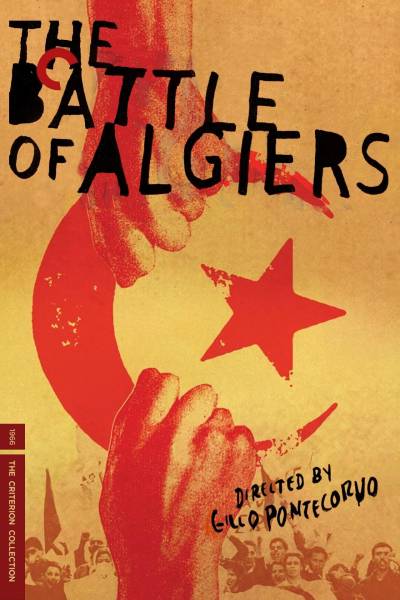Fiche Personne
Théâtre
Cinéma/TV
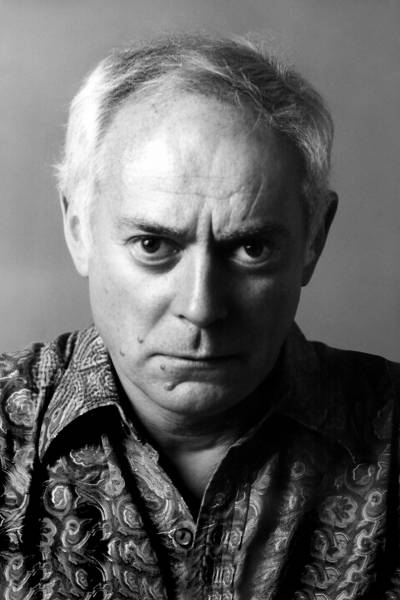 ©
©
Jean Martin
Acteur/trice, Comédien(ne)
(Homme)
France
 ©
©
Site web : www.imdb.com/name/nm0552483
Français
Jean Martin, né le 6 mars 1922 à Paris et mort le 2 février 2009 dans la même ville, est un acteur français. Issu d’une famille berrichonne, il passe une partie de son enfance à Biarritz, où son père est employé chez un fourreur. Pendant la Seconde Guerre Mondiale, il se cache afin d’échapper au Service du Travail Obligatoire. Resté à Paris, il fait de la figuration dans deux films de Maurice Tourneur: "La main du diable" (1942) puis "Cécile est morte" (1943). Au crépuscule des années quarante, il se met à faire du théâtre.
En 1953, Jean Martin accède à la notoriété en jouant la nouvelle pièce du dramaturge irlandais Samuel Beckett, "En attendant Godot", sous la direction de Roger Blin, devenant le premier à endosser le rôle de Lucky. Ce même Roger Blin monte quelques années plus tard "Fin de partie" (1957), du même Beckett, et confie au même Jean Martin le rôle de Clov. En 1960, Jean Martin monte sa première pièce, "Lettre morte", de Robert Pinget. En 1962, derechef il monte une pièce, «Les représentants», de Aglaé et Mona Mitropoulos, adaptée par Michel Arnaud. Parallèlement à cette carrière théâtrale qui s’avèrera riche, Jean Martin retourne au cinéma: «Notre-Dame de Paris» (1956), de Jean Delannoy, "Paris nous appartient" (1958), de Jacques Rivette, "Ballade pour un voyou" (1962), de Jean-Claude Bonnardot, "La foire aux cancres" (1963), de Louis Daquin et "À toi de faire mignonne" (1963), de Bernard Borderie.
En 1960, il est signataire du Manifeste des 121 titré "Déclaration sur le droit à l’insoumission dans la guerre d’Algérie". En 1965, un rôle marquera sa carrière, celui du colonel Mathieu, dans un film retraçant la lutte en 1957 pour le contrôle du quartier de la Casbah d’Alger entre les militants du FLN et des soldats français: "La Bataille d’Alger". Trois ans après la fin de la guerre d’Algérie, le sujet est encore sensible de chaque coté de la méditerranée, le film fût à ce propos interdit en France à sa sortie, puis censuré jusqu’en 2004. Jean Martin, très convainquant dans ce rôle de commandant de division (historiquement, le commandant est le Général Massu, mais le personnage est inspiré du Colonel Bigeard), est le seul acteur professionnel du film. Sa grande stature, sa forte personnalité et son visage impérieux le prédisposent à des rôles de notables faisant généralement montre d’autorité: médecin chef, commissaire de police, haut gradé militaire, dignitaire ecclésiastique…; l’un des plus impressionnants sera sans doute celui d’un médecin expulsant de son hôpital avec véhémence un juge Fayard, Patrick Dewaere, un peu cavalier dans "Le Juge Fayard Dit Le Shérif" (1976). Claude Zidi met en dérision ces rôles dans ses comédies: proviseur dans «La moutarde me monte au nez» (1974), directeur de banque dans "La Course À L’Échalote" (1975), médecin chef dans «L’aile ou la cuisse» (1976), inspecteur principal dans «Bête mais discipliné» (1979) et examinateur dans «Inspecteur la Bavure» (1980). Aux cotés de Jean-Paul Belmondo, il est… cardinal dans «L’Hériter» (1972) et… commissaire divisionnaire dans "Peur Sur La ville" (1975)! Mais aussi aux cotés de Terence Hill dans "Mon Nom est Personne" (1973) dans le rôle de Sullivan, ou "Un Génie, Deux Associés, Une Cloche (1975).
Après avoir consacré une grande partie de sa carrière au théâtre, joué dans une cinquantaine de films, Jean Martin décède le 2 février 2009, à Paris.
http://www.imdb.com/name/nm0552483
En 1953, Jean Martin accède à la notoriété en jouant la nouvelle pièce du dramaturge irlandais Samuel Beckett, "En attendant Godot", sous la direction de Roger Blin, devenant le premier à endosser le rôle de Lucky. Ce même Roger Blin monte quelques années plus tard "Fin de partie" (1957), du même Beckett, et confie au même Jean Martin le rôle de Clov. En 1960, Jean Martin monte sa première pièce, "Lettre morte", de Robert Pinget. En 1962, derechef il monte une pièce, «Les représentants», de Aglaé et Mona Mitropoulos, adaptée par Michel Arnaud. Parallèlement à cette carrière théâtrale qui s’avèrera riche, Jean Martin retourne au cinéma: «Notre-Dame de Paris» (1956), de Jean Delannoy, "Paris nous appartient" (1958), de Jacques Rivette, "Ballade pour un voyou" (1962), de Jean-Claude Bonnardot, "La foire aux cancres" (1963), de Louis Daquin et "À toi de faire mignonne" (1963), de Bernard Borderie.
En 1960, il est signataire du Manifeste des 121 titré "Déclaration sur le droit à l’insoumission dans la guerre d’Algérie". En 1965, un rôle marquera sa carrière, celui du colonel Mathieu, dans un film retraçant la lutte en 1957 pour le contrôle du quartier de la Casbah d’Alger entre les militants du FLN et des soldats français: "La Bataille d’Alger". Trois ans après la fin de la guerre d’Algérie, le sujet est encore sensible de chaque coté de la méditerranée, le film fût à ce propos interdit en France à sa sortie, puis censuré jusqu’en 2004. Jean Martin, très convainquant dans ce rôle de commandant de division (historiquement, le commandant est le Général Massu, mais le personnage est inspiré du Colonel Bigeard), est le seul acteur professionnel du film. Sa grande stature, sa forte personnalité et son visage impérieux le prédisposent à des rôles de notables faisant généralement montre d’autorité: médecin chef, commissaire de police, haut gradé militaire, dignitaire ecclésiastique…; l’un des plus impressionnants sera sans doute celui d’un médecin expulsant de son hôpital avec véhémence un juge Fayard, Patrick Dewaere, un peu cavalier dans "Le Juge Fayard Dit Le Shérif" (1976). Claude Zidi met en dérision ces rôles dans ses comédies: proviseur dans «La moutarde me monte au nez» (1974), directeur de banque dans "La Course À L’Échalote" (1975), médecin chef dans «L’aile ou la cuisse» (1976), inspecteur principal dans «Bête mais discipliné» (1979) et examinateur dans «Inspecteur la Bavure» (1980). Aux cotés de Jean-Paul Belmondo, il est… cardinal dans «L’Hériter» (1972) et… commissaire divisionnaire dans "Peur Sur La ville" (1975)! Mais aussi aux cotés de Terence Hill dans "Mon Nom est Personne" (1973) dans le rôle de Sullivan, ou "Un Génie, Deux Associés, Une Cloche (1975).
Après avoir consacré une grande partie de sa carrière au théâtre, joué dans une cinquantaine de films, Jean Martin décède le 2 février 2009, à Paris.
http://www.imdb.com/name/nm0552483
English
Jean Martin, born March 6, 1922 in Paris and died February 2, 2009 in the same city, is a French actor. Coming from a Berry family, he spent part of his childhood in Biarritz, where his father worked for a furrier. During the Second World War, he hid to escape the Forced Labor Service. Staying in Paris, he appeared in two films by Maurice Tourneur: "The Devil's Hand" (1942) then "Cécile Est Mort" (1943). At the twilight of the forties, he started doing theater.
In 1953, Jean Martin gained notoriety by playing the new play by Irish playwright Samuel Beckett, "Waiting for Godot", under the direction of Roger Blin, becoming the first to take on the role of Lucky. The same Roger Blin produced “End of the Game” (1957), by the same Beckett, a few years later, and entrusted the same Jean Martin with the role of Clov. In 1960, Jean Martin staged his first play, “Letter Dead”, by Robert Pinget. In 1962, he again staged a play, “The Representatives”, by Aglaé and Mona Mitropoulos, adapted by Michel Arnaud. Alongside this theatrical career which would prove to be rich, Jean Martin returned to cinema: “Notre-Dame de Paris” (1956), by Jean Delannoy, “Paris belongs to us” (1958), by Jacques Rivette, “Ballade for a thug " (1962), by Jean-Claude Bonnardot, "La foire aux dunces" (1963), by Louis Daquin and "À toi de fait mignon" (1963), by Bernard Borderie.
In 1960, he was a signatory of the Manifesto of the 121 entitled “Declaration on the right to insubordination in the Algerian war”. In 1965, a role marked his career, that of Colonel Mathieu, in a film retracing the struggle in 1957 for control of the Casbah district of Algiers between FLN militants and French soldiers: "The Battle of Algiers" . Three years after the end of the Algerian War, the subject is still sensitive on each side of the Mediterranean; the film was banned in France upon its release, then censored until 2004. Jean Martin, very convincing in this role of division commander (historically, the commander is General Massu, but the character is inspired by Colonel Bigeard), is the only professional actor in the film. His large stature, his strong personality and his imperious face predispose him to notable roles generally showing authority: chief doctor, police commissioner, high-ranking military officer, ecclesiastical dignitary…; one of the most impressive will undoubtedly be that of a doctor vehemently expelling from his hospital a judge Fayard, Patrick Dewaere, a bit of a cavalier in "Le Juge Fayard Dit Le Shérif" (1976). Claude Zidi mocks these roles in his comedies: principal in “La moutarde monte au nose” (1974), bank director in “La Course À L'Échalote” (1975), chief doctor in “L'aile ou la thigh” (1976), principal inspector in “Bête mais disciplined” (1979) and examiner in “Inspecteur la Bavure” (1980). Alongside Jean-Paul Belmondo, he is… cardinal in “L’Hériter” (1972) and… divisional commissioner in “Peur Sur La ville” (1975)! But also alongside Terence Hill in “My Name is Nobody” (1973) in the role of Sullivan, or “One Genius, Two Associates, One Bell (1975).
After devoting a large part of his career to the theater, appearing in around fifty films, Jean Martin died on February 2, 2009, in Paris.
http://www.imdb.com/name/nm0552483
In 1953, Jean Martin gained notoriety by playing the new play by Irish playwright Samuel Beckett, "Waiting for Godot", under the direction of Roger Blin, becoming the first to take on the role of Lucky. The same Roger Blin produced “End of the Game” (1957), by the same Beckett, a few years later, and entrusted the same Jean Martin with the role of Clov. In 1960, Jean Martin staged his first play, “Letter Dead”, by Robert Pinget. In 1962, he again staged a play, “The Representatives”, by Aglaé and Mona Mitropoulos, adapted by Michel Arnaud. Alongside this theatrical career which would prove to be rich, Jean Martin returned to cinema: “Notre-Dame de Paris” (1956), by Jean Delannoy, “Paris belongs to us” (1958), by Jacques Rivette, “Ballade for a thug " (1962), by Jean-Claude Bonnardot, "La foire aux dunces" (1963), by Louis Daquin and "À toi de fait mignon" (1963), by Bernard Borderie.
In 1960, he was a signatory of the Manifesto of the 121 entitled “Declaration on the right to insubordination in the Algerian war”. In 1965, a role marked his career, that of Colonel Mathieu, in a film retracing the struggle in 1957 for control of the Casbah district of Algiers between FLN militants and French soldiers: "The Battle of Algiers" . Three years after the end of the Algerian War, the subject is still sensitive on each side of the Mediterranean; the film was banned in France upon its release, then censored until 2004. Jean Martin, very convincing in this role of division commander (historically, the commander is General Massu, but the character is inspired by Colonel Bigeard), is the only professional actor in the film. His large stature, his strong personality and his imperious face predispose him to notable roles generally showing authority: chief doctor, police commissioner, high-ranking military officer, ecclesiastical dignitary…; one of the most impressive will undoubtedly be that of a doctor vehemently expelling from his hospital a judge Fayard, Patrick Dewaere, a bit of a cavalier in "Le Juge Fayard Dit Le Shérif" (1976). Claude Zidi mocks these roles in his comedies: principal in “La moutarde monte au nose” (1974), bank director in “La Course À L'Échalote” (1975), chief doctor in “L'aile ou la thigh” (1976), principal inspector in “Bête mais disciplined” (1979) and examiner in “Inspecteur la Bavure” (1980). Alongside Jean-Paul Belmondo, he is… cardinal in “L’Hériter” (1972) and… divisional commissioner in “Peur Sur La ville” (1975)! But also alongside Terence Hill in “My Name is Nobody” (1973) in the role of Sullivan, or “One Genius, Two Associates, One Bell (1975).
After devoting a large part of his career to the theater, appearing in around fifty films, Jean Martin died on February 2, 2009, in Paris.
http://www.imdb.com/name/nm0552483
Films(s)
-
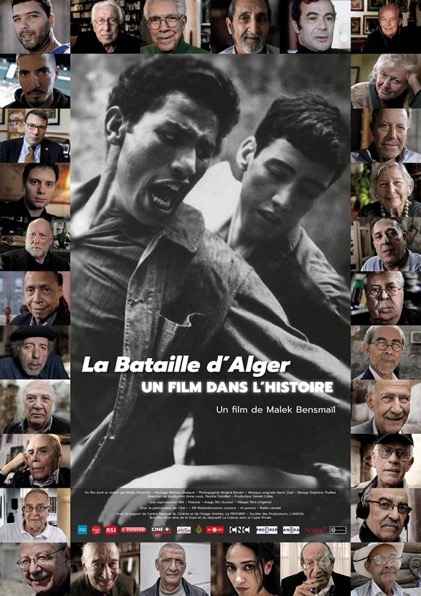 Bataille d’Alger (La), un film dans l’HistoireLong-métrage – 2017Du cœur de la Casbah d’Alger à Rome, de Paris aux Etats-Unis, en s’appuyant sur de très nombreux témoignages et des archives exceptionnelles, le nouveau film de Malek Bensmail opère, soixante ans plus tard, un retour pas…Jean Martin est lié(e) à ce film en tant que comédien(ne)
Bataille d’Alger (La), un film dans l’HistoireLong-métrage – 2017Du cœur de la Casbah d’Alger à Rome, de Paris aux Etats-Unis, en s’appuyant sur de très nombreux témoignages et des archives exceptionnelles, le nouveau film de Malek Bensmail opère, soixante ans plus tard, un retour pas…Jean Martin est lié(e) à ce film en tant que comédien(ne) -
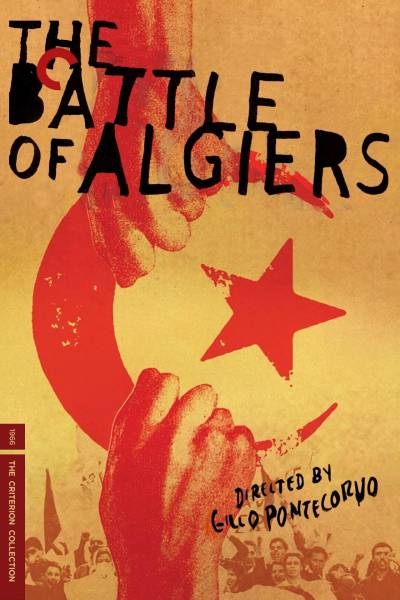 Marxist Poetry: The Making of The Battle of AlgiersMoyen-métrage – 2004Le titre de ce long métrage documentaire fascinant, réalisé pour la sortie du film Criterion Collection, est tiré du commentaire de Pauline Kael dans sa critique du film selon lequel le r&eacu…Jean Martin est lié(e) à ce film en tant que comédien(ne)
Marxist Poetry: The Making of The Battle of AlgiersMoyen-métrage – 2004Le titre de ce long métrage documentaire fascinant, réalisé pour la sortie du film Criterion Collection, est tiré du commentaire de Pauline Kael dans sa critique du film selon lequel le r&eacu…Jean Martin est lié(e) à ce film en tant que comédien(ne) -
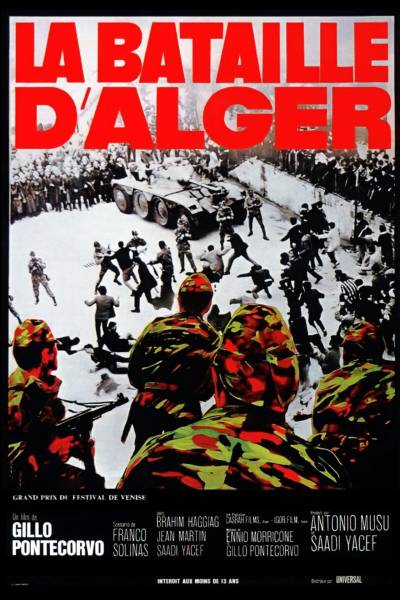 La Bataille d’AlgerLong-métrage – 1966"La Bataille d'Alger" (italien : La Battaglia di Algeri, arabe : معركة الجزائر), est un film algéro-italien de Gillo Pontecorvo…Jean Martin est lié(e) à ce film en tant que comédien(ne)
La Bataille d’AlgerLong-métrage – 1966"La Bataille d'Alger" (italien : La Battaglia di Algeri, arabe : معركة الجزائر), est un film algéro-italien de Gillo Pontecorvo…Jean Martin est lié(e) à ce film en tant que comédien(ne) -
 La Bataille d’Alger, l’empreinteMoyen-métrage – 0Cheikh Djemaï revient sur la genèse du long métrage de Gillo Pontecorvo, La Bataille d’Alger (1965). Par le biais d’images d’archives, d’extraits du film et d’interviews d…Jean Martin est lié(e) à ce film en tant que comédien(ne)
La Bataille d’Alger, l’empreinteMoyen-métrage – 0Cheikh Djemaï revient sur la genèse du long métrage de Gillo Pontecorvo, La Bataille d’Alger (1965). Par le biais d’images d’archives, d’extraits du film et d’interviews d…Jean Martin est lié(e) à ce film en tant que comédien(ne) -
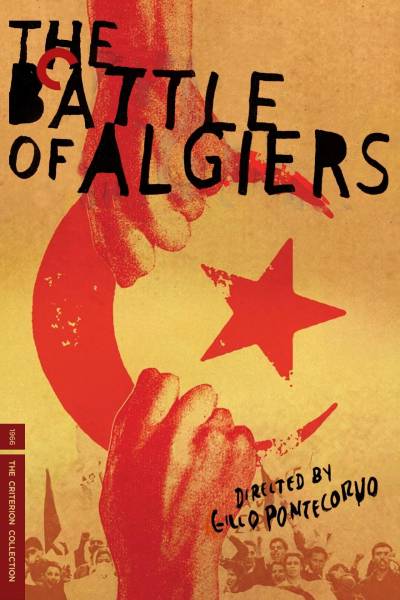 Five Directors On The Battle of AlgiersCourt-métrage – 0Ce documentaire de 17 minutes est présenté sur le DVD 3-Disc Criterion Collection de La Bataille d'Alger (1966), sorti en 2004. Un regard approfondi sur la Bataille d'Alger à travers les yeux…Jean Martin est lié(e) à ce film en tant que comédien(ne)
Five Directors On The Battle of AlgiersCourt-métrage – 0Ce documentaire de 17 minutes est présenté sur le DVD 3-Disc Criterion Collection de La Bataille d'Alger (1966), sorti en 2004. Un regard approfondi sur la Bataille d'Alger à travers les yeux…Jean Martin est lié(e) à ce film en tant que comédien(ne)
Partager :



